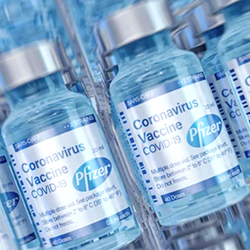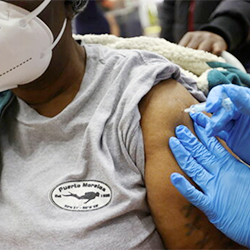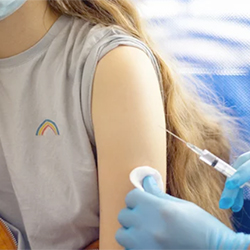By IDSE News Staff
The FDA expanded the emergency use authorization for the messenger RNA COVID-19 vaccine developed by Pfizer-BioNTech to allow a booster for individuals 12 years of age and older.

The booster dose is the same dosage strength (30 mcg) as the dose approved in the primary series.
The FDA reviewed real-world data from Israel, including safety data from more than 6,300 individuals 12 through 15 years of age who received a booster dose of the vaccine at least five months following completion of the primary two-dose vaccination series.
The agency determined that the protective health benefits of a single booster dose of the Pfizer-BioNTech COVID-19 vaccine provided continued protection against COVID-19, and the associated serious consequences that can occur, including hospitalization and death, outweigh the potential risks in people 12 through 15 years of age.
The data showed no new safety concerns following a booster in this population. There were no new cases of myocarditis or pericarditis reported to date in these individuals, according to the FDA.
“With the current wave of the omicron variant, it’s critical that we continue to take effective, life-saving preventative measures such as primary vaccination and boosters, mask wearing and social distancing in order to effectively fight COVID-19,” said acting FDA Commissioner Janet Woodcock, MD, adding that the FDA has been adapting recommendations quickly as the virus evolves.
Third Primary Dose
Children 5 through 11 years of age who have undergone a solid-organ transplant, or who have been diagnosed with conditions that are considered to have an equivalent level of immunocompromise, may not respond adequately to the two-dose primary vaccination series. Therefore, the FDA is allowing a third primary series dose for certain immunocompromised children 5 through 11 years old at least 28 days following the second dose—the same recommendation that is made for older immunocompromised people.
This authorization is based on information extrapolated from an independent report evaluating the safety and effectiveness of a third dose in adults who received solid-organ transplants. A third primary dose of the Pfizer-BioNTech vaccine was previously authorized for individuals at least 12 years of age who have been determined to have certain kinds of immunocompromise.
Shorter Time to Boosters
The FDA also shortened the time between the completion of the primary vaccination of the vaccine and a booster dose to at least five months, rather than six months.
Real-world evidence from the Ministry of Health of Israel on the administration of more than 4.1 million third doses of the Pfizer-BioNTech COVID-19 vaccine given at least five months after the primary series revealed no new safety concerns in people 16 years of age and older.
In addition, peer-reviewed data from multiple laboratories indicate that a booster dose of the Pfizer-BioNTech COVID-19 vaccine greatly improves an individual’s antibody response to be able to counter the omicron variant. Authorizing booster vaccination to take place at five months rather than six months may therefore provide better protection sooner for individuals against the highly transmissible omicron variant. Given the demonstrated safety and effectiveness of a booster dose when administered five months after the primary vaccination series, and the fact that a booster dose may help provide better protection against the rapidly spreading omicron variant, the FDA has determined that the known and potential benefits of administering a booster to individuals ages 12 and older at least five months following completion of the primary vaccination series outweighs the known and potential risks, the FDA said in a statement.
While this action applies only to the Pfizer-BioNTech COVID-19 vaccine, the FDA said it is reviewing data concerning all available vaccines and will provide additional updates as appropriate, the agency said.
“Based on the FDA’s assessment of currently available data, a booster dose of the currently authorized vaccines may help provide better protection against both the delta and omicron variants. In particular, the omicron variant appears to be slightly more resistant to the antibody levels produced in response to the primary series doses from the current vaccines,” said Peter Marks, MD, PhD, the director of the FDA’s Center for Biologics Evaluation and Research. “With this in mind, the FDA has extended the range of individuals eligible to receive a booster, shortened the length of time between the completion of the Pfizer primary series for individuals to receive a booster and is authorizing a third protective vaccine dose for some of our youngest and most vulnerable individuals.”
—From FDA and Pfizer press materials.




